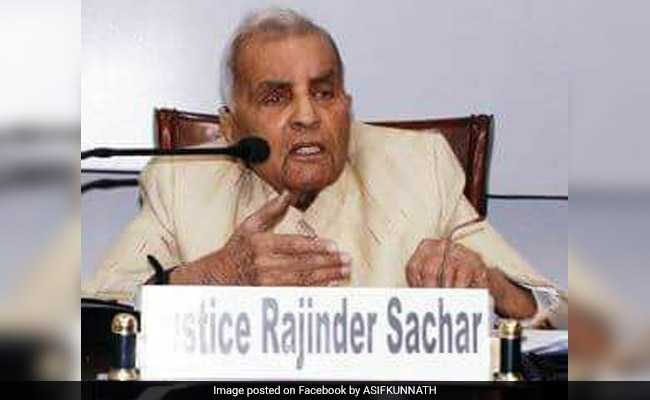Manzar Imam
Former Chief Justice of Delhi High Court, Justice Rajinder Sachar passed away on Friday, 20 April, 2018. He was 94 and is survived by a son and a daughter.
Son of Bhim Sen Sachar, a former Chief Minister of Punjab, Sachar was born on 22 December, 1923 in Lahore and completed his studies there.
Post-Partition, he began his legal practice in 1952 and became a lawyer in the Supreme Court in December 1960. He was Additional Judge at the Delhi High Court from 1970 to 1972 and later on 6 August 1985 became its Chief Justice. He also served as acting Chief Justice of other High Courts in the country. He was also inducted a member of the United Nations’ Sub-Commission on the Promotion and Protection of Human Rights.
A great advocate of civil liberties, a renowned human rights activist and a “legend in his own lifetime” as described by Tahir Mahmood, Justice Sachar remained proactive for causes of human rights. He supported the demand for women’s reservation in Parliament and considered the university elections as a first step towards democracy.
The Government of India constituted Sachar Committee that he headed, which highlighted the social, economic and educational backwardness of Muslims in India will remain one of his most memorable works. The 405-page report’s findings served as an eye-opener about the plight of Muslims against allegations of Muslim appeasement. It revealed that the condition of Muslims in India was worse than the condition of Dalits, Scheduled Castes and Scheduled Tribes on any parameter of development.
As chairman of Prime Minister’s High Level Committee For Preparation of Report on Social, Economic and Educational Status of the Muslim Community of India, best known as Sachar Committee, Justice Sachar not only submitted the landmark report in time, he kept pushing for implementation of the recommendations to improve the condition of Muslims and other religious minorities.
Justice Sachar believed that “the Preamble of the Constitution determines the policies and programmes that any government makes”. For him being secular did not mean being irreligious. It means “every religion, every path is same in the eyes of the State”.
Sachar was a well read man and he would quote great religious personalities like Prophet Muhammad and Swami Vivekananda to bring home the point that no race or religion was superior to any (other) religion. He felt that there was an urgent need for ensuring diversity in education and suggested that all religions should be taught as part of information and, not as part of religion. Otherwise, our children will have an exclusive education and knowledge of religion.
He favoured ‘inclusive development’ and suggested that any inclusive mode of development has to take into account all the people. Law must provide effective mechanism for expeditious redress of complaints.
He feared that secularism was being misrepresented and nothing would change if people did not speak up. During a lecture in a national seminar on “Human Rights and Good Governance in India and West Asia” at Jamia Millia Islamia on 26 November, 2014 Justice Sachar had remarked that Muslims should not get up and declare that they are not terrorists every time there is a terrorist activity. “You (Muslims) don’t have to adopt this attitude”. He was referring to certain elements who raise doubts about Indian Muslims’ patriotism and wish to create a psychological impression in their minds that they should feel guilty for any terror incidence.
Sachar was the only judge who had refused to yield to the government orders during Emergency. He was honoured with the first V R Krishna Iyer award by the Forum for Democracy and Communal Amity. His death is being widely mourned by human rights activists and civil society organizations. Senior advocate HS Phoolka described his death as “A great loss”. “Grieved and shocked” at the passing away of a “strong, fearless and caring” person, said activist Aruna Roy. Justice Rajinder Sachar will be remembered for his “unswerving commitment to the cause of justice for the 1984 anti-Sikh riot victims”, said a report in The Tribune daily.
Prominent Muslim leaders Maulana Mahmood Madani, Prof. Akhtarul Wasey and others expressed grief over his demise. Justice (Retd.) Suhail Ejaz Siddiqui, former Chairman of National Commission for Minority Educational Institutions, called him a bold and fearless leader whose death was a great loss especially to Muslims. It its condolence message, Jamaat-e-Islami Hind said, “We are deeply saddened by the death of Justice Rajinder Sachar”. It termed his demise a loss for the whole nation, for civil society and especially the Muslim community of India.
The best and biggest tribute to Justice Sachar would be to carry his legacy and the work he began as a movement for civil liberties and for protection of human rights.
(The author is a Ph.D. Fellow at the Academy of International Studies, Jamia Millia Islamia)

































